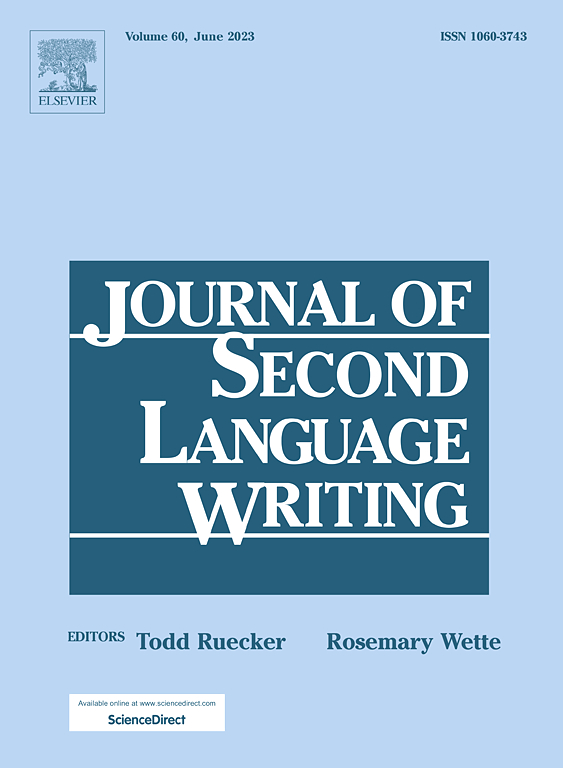计算机辅助协作写作中任务复杂性对第二语言写作过程和成果的影响
IF 4.5
1区 文学
Q1 LINGUISTICS
引用次数: 0
摘要
在这项研究中,我们调查了任务复杂性在多大程度上影响了写作行为、相关的认知活动,以及第二语言(L2)用户在协作写作环境中完成综合任务所产生的文本。参与者是56名具有欧洲共同语言参考框架(CEFR) B2和C1水平的中国第二语言使用者。他们被随机分成28对。每组都完成了两个认知复杂程度不同的阅读-写作任务。简单的任务版本要求参与者总结一篇文章,而复杂的任务版本要求参与者通过整合三篇文章中的信息来写一篇摘要。参与者的打字行为通过击键记录软件被记录下来。在第二项任务之后,八对被试被邀请进行刺激回忆访谈。一系列的线性混合效应模型发现,简单的任务版本激发了更高的速度流畅性,更长和更频繁的停顿,并提高了语言复杂性和功能充分性。这些发现,连同受刺激的回忆注释,表明简单任务版本减轻了文本组织的认知负担,释放了语言编码的资源。本文章由计算机程序翻译,如有差异,请以英文原文为准。
The effects of task complexity on second language writing processes and products in computer-assisted collaborative writing
In this study, we investigated the extent to which task complexity impacted writing behaviors, associated cognitive activities, and resulting texts of second language (L2) users completing integrated tasks in collaborative writing contexts. The participants were 56 Chinese users of L2 English, with Common European Framework of Reference for Languages (CEFR) B2 and C1 proficiency. They were organized into 28 randomly assigned pairs. Each pair completed two reading-to-write tasks which varied in cognitive complexity. The simple task version required participants to summarize a single text, while the complex task version asked participants to write a summary by integrating information presented in three texts. Participants’ typing behaviors were recorded via keystroke logging software. Eight pairs were invited to stimulated recall interviews after the second task. A series of linear mixed-effects models found that the simple task version elicited higher speed fluency, longer and more frequent pauses, and improved linguistic complexity and functional adequacy. These findings, together with the stimulated recall comments, suggest that the simple task version reduced cognitive burden on text organization, freeing up resources for linguistic encoding.
求助全文
通过发布文献求助,成功后即可免费获取论文全文。
去求助
来源期刊

Journal of Second Language Writing
LINGUISTICS-
CiteScore
8.80
自引率
13.10%
发文量
50
审稿时长
59 days
期刊介绍:
The Journal of Second Language Writing is devoted to publishing theoretically grounded reports of research and discussions that represent a significant contribution to current understandings of central issues in second and foreign language writing and writing instruction. Some areas of interest are personal characteristics and attitudes of L2 writers, L2 writers'' composing processes, features of L2 writers'' texts, readers'' responses to L2 writing, assessment/evaluation of L2 writing, contexts (cultural, social, political, institutional) for L2 writing, and any other topic clearly relevant to L2 writing theory, research, or instruction.
 求助内容:
求助内容: 应助结果提醒方式:
应助结果提醒方式:


